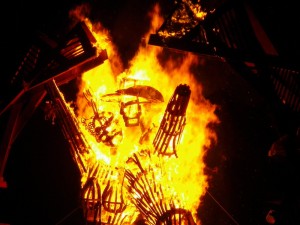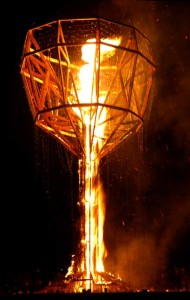On this just past Easter Sunday I woke next to Mz Honey J, always a pleasant way to start the morning. We made our way to the nearby Waffle House, which was open just as we’d hoped. As Honey drank diner coffee and ate a double helping of waffles and I dug into some eggs and hash browns, our topic of conversation naturally turned to religion.

I was born a Catholic, though I should qualify this a little for my Texas readers — the strain of Catholic I come from is a very liberal one in many ways, especially compared to what people often experience in this part of the world. Honey remembers her early church experiences as a boring chore she went through for the sake of her parents (who were in turn, it turns out, attending for the sake of their parents). In contrast, I had a definite interest in the goings on at church (hyperactive outbursts in Sunday School notwithstanding*). I wouldn’t say I was especially devout as a kid, but something in the experience had merit for me.
(*When the fire engine goes by, announcing ‘If the nun’s habits catch on fire, Stop Drop & Roll!’ is met with disapproval. I guess no one appreciates free safety advice.)
And then I got burnt out. As a young teen with strong feminist leanings, the sexism of the Catholic church was unappealing to me. The more I thought about it, the more the whole story or myth cycle of the religion just didn’t work for me. Around this time my parents got divorced and, perhaps emboldened by her split from my father, my mother began exploring Wicca.
There was never any pressure to convert, but the books she purchased were left around and as a voracious reader I devoured them like any other. The religion appealed for a lot of reasons — it didn’t demonize my budding sexuality, it treated people of different genders more equally. While the descriptions of groups like the Ordo Templi Orientis in Drawing Down the Moon were fascinating, I knew that my lifelong rebelliousness against authority figures meant that hierarchical groups were right out.
My mom and I practiced some simple things together and moved from celebrating Christmas to celebrating the Wiccan wheel of the year in a loose way. It wasn’t until I moved to Austin at the start of my twenties that I really got into Paganism. It was at this point that I started attending campouts with the Council of Magickal Arts. I was also drawn to Tejas Web, the local group in the Reclaiming tradition of Wicca. For a while I was heavily involved — I even took on leadership roles in some of Reclaiming’s holiday rituals.

And then the gloss wore off and I got bored again. I can remember specific moments where I looked around in the midst of a holiday and realized that I felt disconnected, that the appeal of it all was going away. The mythology didn’t ring true to me — or at least, it was becoming increasingly clear that for me at least it didn’t matter. That is, whether or not there were higher powers or anything greater than us, whether or not there was a deeper spiritual meaning in the seasons or anything like reincarnation, it really had no bearing on my day-to-day life.
That’s when I attended my first Burning Flipside. As anyone who knows me can tell you, my life changed that long weekend in 2001. The burning of the effigy — which that year was a three-faced, twin gendered alien-monster-robot hybrid — was a deeply powerful moment for me, and here at last it seems I’ve found a home (at least judging by the last decade of growing involvement).
The Burning Man community offers me so much of what I’d been seeking in religion. It gave a strong sense of community built around an ethical framework; it was positive towards sexuality, all possible genders, and just about any kind of subculture. Most of all it was built around a powerful ritual.
A ritual that comes without mythology or built-in meaning. It’s not an act of worship to any higher power. It is whatever one makes it into — it can mean as much to you as it does to me, or it could mean nothing more than the culmination of a great weekend of partying. Larry Harvey, one of the founders of Burning Man, insists that there is no “official” explanation.
What does it mean to me? That’s not the point of this post. The point is that here, at last, was a place where no one would tell me what to do or why, would embrace who I really was, and provide that core element I had really been searching for in all the others: a ritual. Catholicism is all about it, and the celebrations of Reclaiming groups are some of the most ornate in Wicca. I believe many humans — and this one certainly — have a powerful and perhaps even neurologically based need for ritual. But I don’t believe that this human needs that ritual to come with the trappings of religion.
And that is one of the biggest reasons why I keep doing this expensive, exhausting, time-consuming Burner thing.